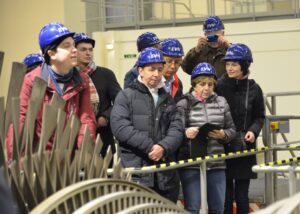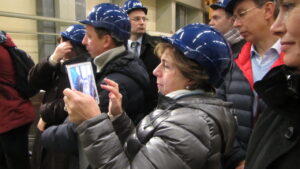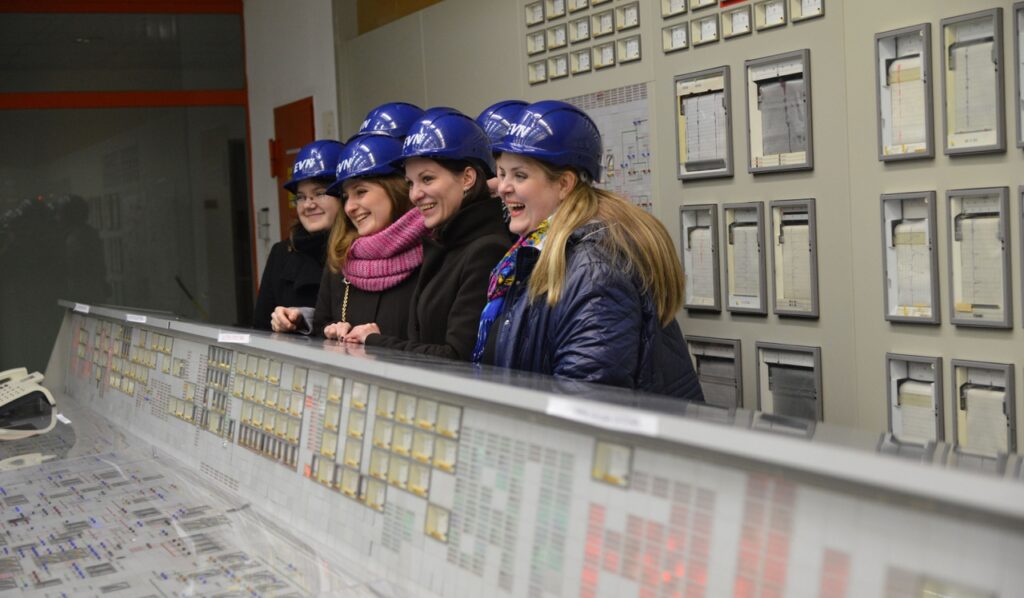 From 12 to 16 December 2016 a group of teachers from the Belarusian State University (BSU) has completed the professional development programme “The role of international cooperation in the development and safe use of nuclear power energy” in Vienna, Austria. The programme was organized by the regional Network for Education and Training in Nuclear Technology (STAR-NET) in cooperation with International atomic Energy Agency (IAEA) and Nuclear Knowledge Management Institute.
From 12 to 16 December 2016 a group of teachers from the Belarusian State University (BSU) has completed the professional development programme “The role of international cooperation in the development and safe use of nuclear power energy” in Vienna, Austria. The programme was organized by the regional Network for Education and Training in Nuclear Technology (STAR-NET) in cooperation with International atomic Energy Agency (IAEA) and Nuclear Knowledge Management Institute.
The BSU is one of the four universities of the Republic of Belarus providing development of a national system of professional education and training of the specialists for the nuclear industry. This is a very high level of responsibility and the teachers who are engaged in training of students should be not only professionals in the field of nuclear chemistry or physics, but also to possess the special knowledge in the field of nuclear safety, nuclear non-proliferation culture, and bases of knowledge management.  The last one is very important as knowledge and carriers of knowledge around the world are considered today as the major resource, a basis for transition to new technological structure and sustainable development. To meet this task the BSU has directed a group of four teachers from chemical faculty, six teachers from physical faculty and ten teachers from International Sakharov Environmental Institute to participate in the training programme on “The role of international cooperation in the development and safe use of nuclear power energy”.
The last one is very important as knowledge and carriers of knowledge around the world are considered today as the major resource, a basis for transition to new technological structure and sustainable development. To meet this task the BSU has directed a group of four teachers from chemical faculty, six teachers from physical faculty and ten teachers from International Sakharov Environmental Institute to participate in the training programme on “The role of international cooperation in the development and safe use of nuclear power energy”.
The uniqueness of the programme which was distinguished by a concentrated combination of theoretical sessions and technical visits is in the fact that the training was being held in Vienna which has been considered long ago as the world centre of nuclear knowledge and its promotion, discussions and innovations affecting all aspects of nuclear energy mastering — from technology to the training of specialists.
Besides, the business-centre TechGate where desk studies and workshops took place is located in five-minute distance from the IAEA that, certainly, created the unique atmosphere of participation in the world community of the nuclear industry specialists.
 After opening of the programme by John de Grosbois, the head of the IAEA Nuclear Knowledge Management section, the Belarusian teachers have been acquainted with the IAEA’s initiatives in the field of nuclear education and training of specialists, with the learning platform CLP4NET possibilities and the role of nuclear energy in socio-political development of the countries, both beginners, and veterans in using the nuclear energy. The systems of standards and the IAEA’s approaches in the field of nuclear safety of radioactive sources and radiation safety of the NPP have been considered. The activity of IAEA in the field of scientific research has been presented by the projects in radiation biology. The practical results of knowledge management used in the nuclear organizations were demonstrated by the examples of the NPP personnel training system. The information on the development of Nuclear Technology Management Master’s programme within framework of the IAEA International Nuclear Management Academy, NPP information models, small modular nuclear power plants, energy planning models aroused the interest of the audience.
After opening of the programme by John de Grosbois, the head of the IAEA Nuclear Knowledge Management section, the Belarusian teachers have been acquainted with the IAEA’s initiatives in the field of nuclear education and training of specialists, with the learning platform CLP4NET possibilities and the role of nuclear energy in socio-political development of the countries, both beginners, and veterans in using the nuclear energy. The systems of standards and the IAEA’s approaches in the field of nuclear safety of radioactive sources and radiation safety of the NPP have been considered. The activity of IAEA in the field of scientific research has been presented by the projects in radiation biology. The practical results of knowledge management used in the nuclear organizations were demonstrated by the examples of the NPP personnel training system. The information on the development of Nuclear Technology Management Master’s programme within framework of the IAEA International Nuclear Management Academy, NPP information models, small modular nuclear power plants, energy planning models aroused the interest of the audience.
The trainees expressed the appreciation to the organizing technical visits to the research reactor TRIGA of the Vienna Atominstitute (TU Wien Atominstitut), NPP Zwentendorf and in the IAEA laboratory in Seibersdorf.
In summary it should be noted that the Belarusian teachers have received a new block of the modern nuclear knowledge, and it is hoped that certificates which were handed to them at the end of training are only the first evidences from STAR-NET which were received by teachers of BSU about upgrading of their qualification.
Tatiana Savitskaya, Deputy Dean of chemical faculty on scientific work
